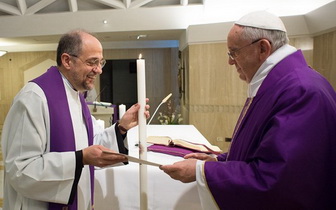Below is the letter sent by Pope Francis to our Father General, for the whole Order, on the occasion of the 500th birthday of St. Teresa of Avila March 28, 2015
(This is copied from our Carmelite Communicationies No 286)
To the Reverend Father Saverio Cannistrà
Superior General of the Order of Discalced Brothers
of the Blessed Virgin Mary of Mount Carmel
Dear Brother:
On the 500th anniversary of the birth of Saint Teresa of Jesus, I wish to unite myself, together with the entire Church, to the great family of the Discalced Carmel –religious women and men and seculars– in their act of thanksgiving for the charism of this exceptional woman.
I consider it a providential grace that this anniversary coincides with the Year of
Consecrated Life, in which the Saint from Ávila shines like a sure beacon and role model of
total surrender to God. It is yet another reason to look on the past with gratitude and
rediscover “the inspiring spark” that has driven founders and their first communities (cf.
Apostolic Letter to All Consecrated People, November 21, 2014).
How beneficial to us is, even to this day, the testimony of her consecration, born from
a direct encounter with Christ, her experience of prayer as a continual dialog with God, her life
in community grounded in the maternity of the Church!
1. Saint Teresa is above all a teacher of prayer. The discovery of the humanity of Christ
was central to her experience. Moved by the desire to share this personal experience with
others, she writes about it in a vital and uncomplicated style, accessible to everyone, because
it consists simply in “an intimate sharing between friends….with Him who we know loves us”
(Life 8, 5). Many times that same phrase becomes a plea, as if wishing to draw the reader into
her interior dialog with Christ. Teresa’s prayer was not reserved for any single moment or part
of the day; it sprang spontaneously during the most varied circumstances: “It would be a hard
thing to bear if we were able to pray only when off in some corner” (Foundations 5, 16). She
was convinced of the value of continual prayer, even if it were not always perfect. La Santa
asks us to faithfully persevere, even in the midst of dryness, personal difficulties, or urgent
needs that claim us.
To renew consecrated life today, Teresa has left us a great treasure full of concrete
proposals, ways and methods to pray, that, far from closing us off into ourselves or merely
providing a path to seek inner balance, makes us begin over again, always from Jesus as a
starting point. It is an authentic school in growth of love of God and neighbour.
2. As a result of her encounter with Jesus Christ, Saint Teresa lived “another life” (cf.
Life 23, 1). Wishing to serve the Church, and in view of the grave problems of her day, she did
not limit herself to simply observing the reality that surrounded her. From her circumstances
as a woman and with the limitations of her health, she says: “I resolved to do the little that
was in my power; that is, to follow the evangelic counsels as perfectly as I could and strive that
these few persons who live here do the same” (Way 1, 2). That is why she began the Teresian
reform, in which she asked her sisters not to waste time “discussing with God matters that
have little importance” when the “world is all in flames” (Way 1, 5). This missionary and
ecclesial dimension has always characterized the Discalced Carmel.
As she did then, so also today la Santa opens up new horizons for us, calls us to a great
endeavor, to see the world with the eyes of Christ, to seek what He seeks and love what He
loves.
3. Saint Teresa knew that neither prayer nor mission could be sustained without
authentic community life. For this reason, the foundation of the monasteries she created was
fraternity: there, “all must be friends, all must be loved, all must be held dear, all must be self-concern in fraternal life, which properly “lies in losing concern about ourselves and our
own satisfaction” (Way 12, 2) and placing ourselves entirely at the service of others. To avoid
this risk, the Saint from Ávila exhorts her sisters, above all, to practice the virtue of humility,
which is neither to belittle oneself exteriorly nor interiorly shrink the soul, but for each to
know what one can do and what God can do in her (cf. Spiritual Testimonies 30). The opposite
is what she calls “accursed honor” (Life 31, 23), source of gossip, jealousy, and criticism that
seriously harms relationships with others. Teresian humility is made of the stuff of self-acceptance,
awareness of ones’ own dignity, missionary courage, gratitude, and abandonment
in God.
From these noble roots, Teresian communities are called to become houses of
communion that witness to fraternal love and the maternity of the Church, presenting to the
Lord the needs of our world torn by division and war.
helped” (Way 4, 7). She placed great importance on warning her religious about the dangers of self-concern in fraternal life, which properly “lies in losing concern about ourselves and our
own satisfaction” (Way 12, 2) and placing ourselves entirely at the service of others. To avoid
this risk, the Saint from Ávila exhorts her sisters, above all, to practice the virtue of humility,
which is neither to belittle oneself exteriorly nor interiorly shrink the soul, but for each to
know what one can do and what God can do in her (cf. Spiritual Testimonies 30). The opposite
is what she calls “accursed honor” (Life 31, 23), source of gossip, jealousy, and criticism that
seriously harms relationships with others. Teresian humility is made of the stuff of selfacceptance,
awareness of ones’ own dignity, missionary courage, gratitude, and abandonment
in God.
From these noble roots, Teresian communities are called to become houses of
communion that witness to fraternal love and the maternity of the Church, presenting to the
Lord the needs of our world torn by division and war.
Dear brother, I do not want to end without thanking the Teresian Carmels that entrust
the Holy Father with special tenderness to the patronage of the Virgin of Carmel, and who
accompany with their prayer the great challenges and threats the Church faces. I ask our Lord
that the example of his life, like that of Saint Teresa, translucent in the joy and beauty of living
the Gospel, may call many young people to follow Christ closely.
I impart my Apostolic Blessing on all the Teresian family.
From the Vatican, March 28, 2015
Two days previously on March 26, 2015 Pope Francis invited Father General to join him to celebrate Mass for World Peace in an hour of prayer for that intention. The whole Carmelite Order joined in this Birthday Gift to St. Teresa, each Community of nuns, friars and seculars setting aside an hour to pray for peace at a time suitable to themselves.


